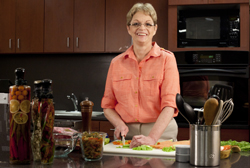“My eating habits have completely changed and I feel so much better. I’m starting a whole new life — and I’m living it for me.”

When her symptoms began, Trenton-resident Caryl Ferrel and her doctors thought she had a nasty stomach bug. When they continued, they thought maybe it was stress related, and turned to diagnoses like ulcerative colitis and irritable bowel. When the treatments didn’t work, Caryl began to worry — and her doctors began to consider cancer.
Leading up to her diagnosis, Caryl dropped six dress sizes. Her employer,
a physician in Hamilton, took note and was very concerned about her health.
“He couldn’t stand to see me wasting away. Then one day I
collapsed in the office and he said, ‘that’s it. I won’t
let you tell me you’re fine this time,’” she says.THE LAST STRAW
“I felt awful. Really awful. The foods I was eating would not stay
down and I was losing a lot of weight,” explains Caryl.
Her employer called a neighboring physician, board certified gastroenterologist Shivaprasad Marulendra, MD, to help Caryl.
“When Caryl described her situation to me, I told her it was best that she go to the emergency department immediately,” explains Dr. Marulendra. Caryl did just that and was admitted to RWJ Hamilton with severe dehydration.
“My numbers were so bad they kept me in the emergency department and treated me for dehydration. The physician explained to me that if I’d waited one more day, I would have gone into kidney failure,” says Caryl.
SNEAK ATTACK
After several days of rehydration and a lot of testing including a conclusive
biopsy, Dr. Marulendra diagnosed Caryl with celiac disease, an autoimmune
disorder characterized by sensitivity to wheat, barley and rye. With celiac
disease, the body does not absorb nutrients the way it is made to, and
as a result, the body becomes malnourished.
Though we are still learning about this condition, it is believed that individuals who have it are born with a genetic predisposition to produce antibodies against gluten, a protein commonly found in wheat, barley and rye.
“It’s as if at some point, the individual ingests something that unlocks these antibodies and the gluten becomes a toxin to the body. When the antibodies attach to the gluten, they attack the villi (fingerlike projections that aid food digestion and absorption in the small intestine). This then causes inflammation and the villi, over time, are destroyed,” Dr. Marulendra explains.
Although individuals with celiac carry this genetic marker from birth, the “unlocking” of the antibodies could take place at any point in their lives. “Someone could go years and years eating gluten with no problem and then all of a sudden, the disease strikes,” adds Dr. Marulendra.
NOW WHAT?
Beyond celiac disease, Caryl was also diagnosed with diabetes and hypertension
during her stay in the hospital. All of which came as a shock to her.
While Caryl was relieved at least to know what she was dealing with, she
was devastated to learn that she would be living with these conditions
for the rest of her life.
Her new lifestyle would require a gluten-free diet, which involved cutting out favorites like pasta, bread, some alcohol and many other common foods. “At that point all I could see were the things I couldn’t have,” Caryl says.
While in the hospital, Caryl met with Kanwal Singh, RD, a dietician with the RWJ Hamilton Food & Nutrition Department. Singh has been living with celiac disease for nine years and offered Caryl a unique education about celiac disease.
“With celiac, there is a big change in your lifestyle, but when compared with the benefits it provides to the person’s total health, the change is small,” explains Singh.
Since her diagnosis, Caryl has made a lot of adjustments, and has seen a lot of improvement. Where before Caryl felt hopeless, she is now feeling empowered to keep herself feeling good by managing her diet.
“My eating habits have completely changed and I feel so much better. I’m starting a whole new life — and I’m living it for me.”